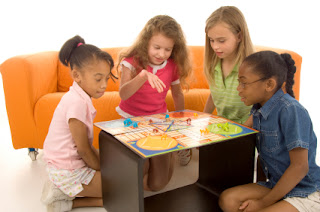Play—A 24/7 JobThe Benefits of Play for Children
by Trisha Roberts
Children’s play is their work, their 24/7 occupation! Childhood is a time of intense learning and growth, and in fact, there is no other time in our lives when we learn more! Foundational skills are learned in our childhood and serve us our entire lifetime. Those skills are learned through interactive play--not in a classroom, not reading a manual, not watching television, not taking a course, and not playing a video game.
 |
| Play Helps Babies Learn and Develop |
Think about the first year of a baby’s life. It is a phenomenal time of growth and learning! Infants learn to lift their head, roll, reach, sit, crawl. Babies learn to stand and walk. They go from a liquid-only diet to eating a wide variety of food and textures. They begin communicating non-verbally and then verbally. Babies develop initial relationships with their parents or primary care providers. And that is just the first 12 months!
 |
| Learning Through Play |
 |
| Imitating Adults Helps Children Acquire Skills |
Toddlers and Pre-schoolers learn coordination, balance, and spatial relationships
as they continue to grow and play. Young children distinguish sounds, learn
language and vocabulary while playing with musical toys and
listening to Nursery Rhymes and Songs. They learn about the world and how it works
by interacting in play.
Playing hop scotch, climbing a slide, and swinging on the playground give kids
a change to develop strength, coordination and balance.
 |
| Climbing Builds Strength |
Coloring, painting, and cutting develop dexterity and hand strength. Kids improve their understanding of spatial relationships when they build with blocks or fit together puzzles.
 |
| Play Teaches Spacial Relationships |
 |
| Make Believe Play |
During Pretend
Play, creativity and improvisation skills are enhanced; children also learn
to sort their emotions and reactions during role playing which leads to better
emotional health. Children learn to cooperate, solve problems, and improve
social skills when they play in a group. They learn how to handle arguments and
disagreements. Children have a chance to ask questions, postulate answers, and
draw conclusions in a safe environment and without judgement when engaging in
play.
 |
| Firefighter in Training! |
 |
| Dress-Up Play |
Older children improve in their ability to reason when they play board games and puzzles. They learn to apply their organizational skills and math abilities in more complex pretend play and cognitively challenging games. Children learn to follow instructions, give directions, organize and manage tasks, develop leadership skills and learn to be good followers. They gain proficiency and expertise in all of these life skills by playing!
 |
| Family Relationships Improve During Play |
 |
| Board Games Teach Turn-Taking and Friendly Competition |
When kids are given time to explore and discover things on their own, they retain the new information longer than when they are “spoon fed” data. As our society moves more and more toward a “Digital World”, we are losing precious teaching tools. Children are spending more time in front of screens and less time engaging in physical movement and hands-on activities, leading to the rampant increase in childhood and adult obesity. Many adolescents don’t develop good interpersonal skills because they rarely interact face-to-face with others.
When children play with their parents or other adults, they develop emotional bonds and shared memories. Parents are more likely to fully engage with their children when actively involved in a game, instead of attending with half an ear and a face turned to their tablets or television. Some parents fall into the trap of thinking that their child needs more activities to “enrich” their lives and they begin the endless cycle of over-scheduling their child’s life—Karate Lessons, Little League, Piano Lessons, Gymnastics, Cheerleading, Soccer League, Girl Scouts, Art Class, Ballet, etc. Don’t misunderstand me. There is nothing wrong with any one of these activities. The problem is that we don’t allow time for our children to just play and we don’t play with them. They become so busy with ‘stuff’ and ‘things’ and ‘activities’ that they don’t have time for fun, unstructured play that leads to the development of critical thinking skills, healthy relationships, strong bodies, and creative minds. A schedule filled with extra-curricular activities is not a substitution for free play.
 |
| Bonding Time as a Family |
 |
| Outdoor Family Play Time--Make it a Priority! |
Play is the vehicle children employ to develop the skills necessary to navigate life. Children need to play as vitally as they need food, water, sleep, and love. One of our roles as parents is to ensure that children have sufficient time to play and to make time to play with them. Play ensures healthier, happier, better-adjusted children and future adults.
Author: Trisha Roberts
www.proeducationaltoys.com
Copyright © 2016 TNT Inspired Enterprise, LLC, All rights reserved.
Unauthorized duplication is a violation of applicable laws.



No comments:
Post a Comment